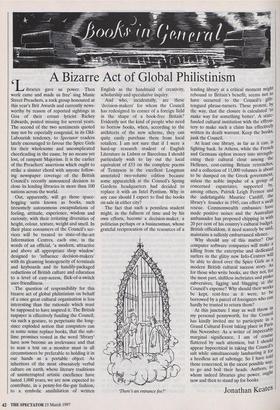A Bizarre Act of Global Philistinism
Libraries gave us power. Then work came and made us free' sing Manic Street Preachers, a rock group honoured at this year's Brit Awards and currently news- worthy by reason of reported sightings in Goa of their errant lyricist Richey Edwards, posted missing for several years. The second of the two sentiments quoted may not be especially congenial, in its Old- Labourish tendency, to Spectator readers lately encouraged to favour the Spice Girls for their wholesome and uncomplicated cheerleading in the cause, by no means yet lost, of rampant Majorism. It is the earlier of the Preachers' assertions which ought to strike a sinister chord with anyone follow- ing newspaper coverage of the British Council's recently announced decision to close its lending libraries in more than 100 nations across the world.
Out, apparently, will go those space- hogging units known as books, such tiresomely autonomous encapsulations of feeling, attitude, experience, wisdom and curiosity, with their irritating diversities of height, colour, texture, weight and smell. In their place consumers of the Council's ser- vices will be treated to state-of-the-art Information Centres, each one, in the words of an official, 'a modern, attractive and above all appropriate shop window' designed to 'influence decision-makers' with its gleaming homogeneity of terminals and keyboards and its handily-packaged reductions of British culture and education to a level of easy-access, flick-of-a-switch user-friendliness.
The question of responsibility for this bizarre act of global philistinism on behalf of a once great cultural organisation is less interesting than the rationale which must be supposed to have inspired it. The British taxpayer is effectively funding the Council, via such a gesture, to perpetuate the long- since exploded notion that computers can in some sense replace books, that the sub- lime promises vested in the word 'library' have now become an irrelevance and that to scan a text on a monitor must in all circumstances be preferable to holding it in our hands as a portable object. As inheritors of the most obsessively verbal culture on earth, whose literary traditions of uninterrupted artistic excellence have lasted 1,000 years, we are now expected to contribute, in a penny-for-the-guy fashion, to a symbolic annihilation of written English as the handmaid of creativity, scholarship and speculative inquiry.
And who, incidentally, are these `decision-makers' for whom the Council has redesigned its corner of a foreign field in the shape of a book-free Britain? Evidently not the kind of people who need to borrow books, when, according to the architects of the new scheme, they can quite easily purchase them from local retailers. I am not sure that if I were a hard-up research student of English Literature in Lisbon or Barcelona I should particularly wish to lay out the local equivalent of £53 on the complete poems of Tennyson in the excellent Longman annotated two-volume edition because some apparatchik at the Council's Spring Gardens headquarters had decided to replace it with an Intel Pentium. Why in any case should I expect to find the books on sale in either city?
The fact that such a penniless student might, in the fullness of time and by his own efforts, become a decision-maker, a politician perhaps or a businessman, whose grateful reciprocation of the resources of a `There's an entrance fee?' lending library at a critical moment might rebound to Britain's benefit, seems not to have occurred to the Council's glib- tongued phrase-turners. These protest, by the way, that the closure is calculated `to make way for something better'. A state- funded cultural institution with the effron- tery to make such a claim has effectively written its death warrant. Keep the books, junk the Council. At least one library, as far as it can, is fighting back. In Athens, while the French and Germans siphon money into strength- ening their cultural clout among the Hellenes, cost-cutting Britain retrenches, and a collection of 11,000 volumes is about to be dumped on the Greek government, unless the noble impulse of a group of concerned expatriates, supported by, among others, Patrick Leigh Fermor and the indefatigable Maurice Cardiff, the library's founder in 1945, can effect a swift rescue. Commonwealth embassies have made positive noises and the Australian ambassador has proposed chipping in with 20 per cent of his country's cultural budget. British officaldom, it need scarcely be said, maintains a sullenly embarrassed silence. Why should any of this matter? Our computer software companies will make a killing from the enterprise and dedicated surfers in the glitzy new Info-Centres Will be able to drool over the Spice Girls as a modern British cultural success story. AS for those who write books, are they not, for the most part, shiftless inebriates and pinko subversives, ligging and blagging at the Council's expense? Why should their works be kept, rent-free as it were, to be borrowed by a parcel of foreigners who can hardly be trusted to return them? At this juncture I may as well throw in . my personal pennyworth, for the Council has kindly invited me to participate in a Grand Cultural Event taking place in Paris this November. As a writer of impeccably marginal significance, I am of course, flattered by such attention, but I should appear hypocritical in taking the Council s salt while simultaneously lambasting it for. a heedless act of sabotage. So I have told those concerned, in the nicest possible way, to go and boil their heads. Authors, to ,. whom indeed libraries give power, ought now and then to stand up for books.
Jonathan Keates


































































 Previous page
Previous page